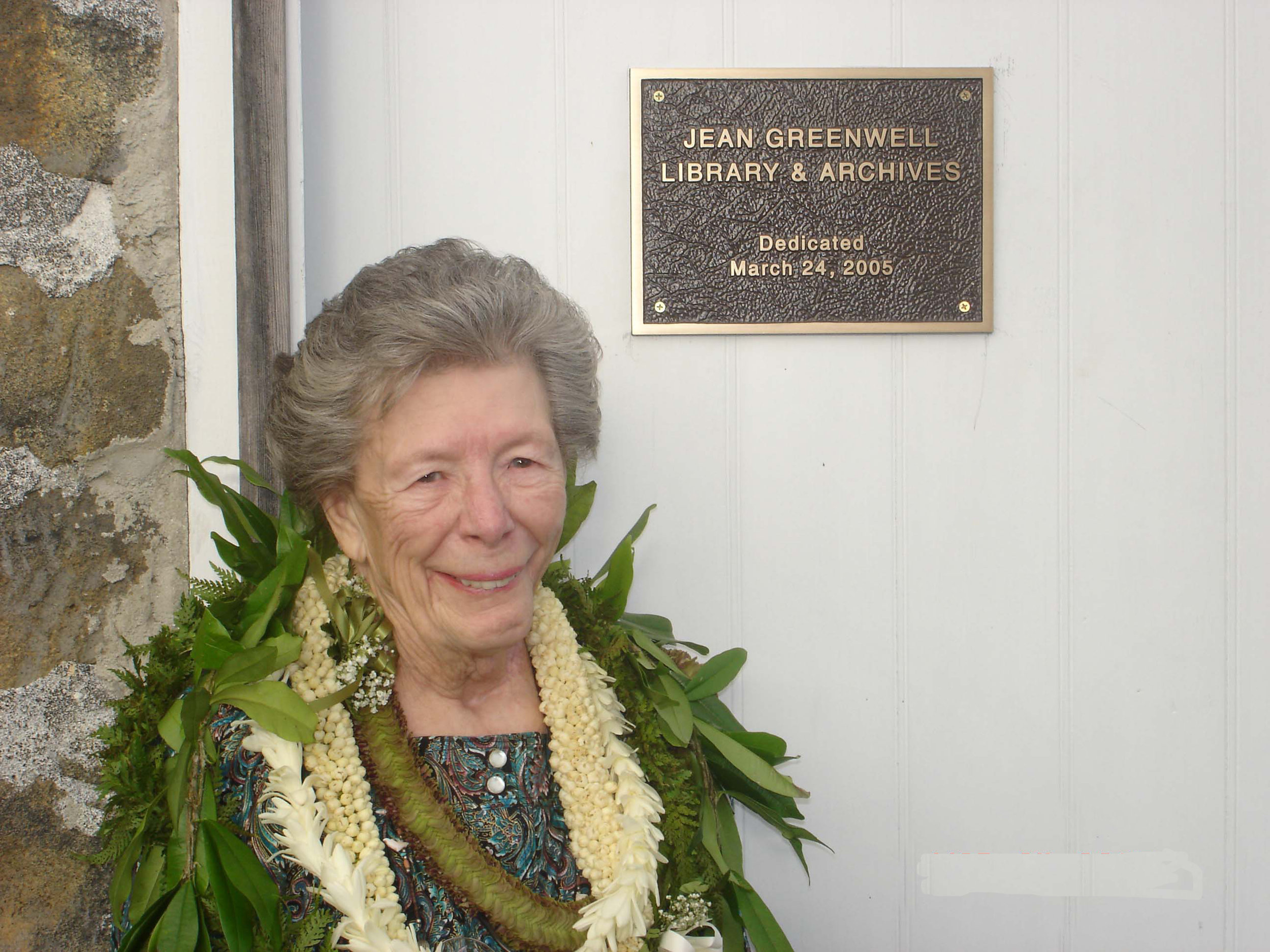For over 30 years, Jean Greenwell was the principal historian at the Kona Historical Society. Born in Loma Linda, California, Jean came to the island of Hawai`i from the New Mexico State University in 1950 to work as a kindergarten teacher at Ola`a Elementary. She married Kona rancher Norman Greenwell and spent much of her life raising a family and researching Kona’s history.
From the very start, Jean had an appreciation for the Hawaiian culture, language, and history. She learned to speak and read Hawaiian, and with the guidance of her mentor, Dorothy Barerre, took on the task of collecting all references to Kona history scattered among repositories throughout the islands. This voluminous body of work was organized and compiled into the file and folder collections now referred to as the Jean Greenwell Research Collection and is the foundation for the Kona Historical Society’s archives. Jean’s generosity in sharing her knowledge has inspired others, and as a result, the archive has grown and now includes diverse sources of research and many photograph collections donated by Kona families.
The archive consists of collections of historical photographs, unpublished diaries, journals, letters, family records and memorabilia, land documents, and selected Kona newspapers and articles. Records of local coffee enterprises, ranches, community clubs, and ethnic organizations include correspondence, minutes of board and committee meetings, financial records, and publications.
The Manuscript Collection includes significant primary material, dating from around 1850 to 1990. The collection illustrates the history of Kona agriculture, coffee, ranching, and beef production; and its churches and missionary activity, civic organizations, and small businesses.
The Society’s Visual Images Collection is comprised of both still photographs and moving images. Between 1980 and 1988 the prints, negatives, and slides in the Photograph Collection were organized, arranged by subject, and made accessible to the public. The Photograph Collection, holds over 50,000 images depicting such subjects as ethnic culture, geography, agriculture, religion, and education in Kona between 1790 and 1994. The Moving Images Collection includes approximately 15,000 feet of restored film depicting Kona between 1930 and 1960, videotapes, and DVDs.
The Oral History Collection includes approximately 100 hours of taped oral history interviews on topics related to life in Kona between 1900 and 1960, ranching, agriculture, coffee, ethnic lifestyles and diversity, employments, and avocations.
The Map Collection consists of over 150 maps of the North and South Kona districts, including the mauka ranch lands; most are reproductions, with a few original hand-drawn maps.
Place Names of Kona is the electronic database that brings together the research of Dorothy Barrere, Lloyd Soehren, and Jean Greenwell. With each researcher using different source material, they were able to pool their extensive knowledge to create this compilation of the place names used by the Hawaiians to describe the Kona environment.
The Hawaiian Kingdom Property Tax Records for the years 1859, 1875, 1881, 1885, 1888, and 1890 have been entered into a research database at the Kona Historical Society archives. The tax records can be used to understand many aspects of Kona’s history: social issues, such as illness, death, and resident mobility into and out of Kona; ethnic land ownership and leasing; and the evolving ethnic participation in the various Kona industries—ranching, fishing, merchandising, and plantation development—during the critical period of 1850-1900.
How to Begin Research in our Archive
The archive is a privately funded and operated research archive. Our collections do not circulate, but we strive to work with the public to provide resources and help where we can. The first step in your research should include identifying resources available at public and state funded libraries and archives with large collections and access policies. If you are now ready to make an appointment for a fee, please go to Our Collections page to schedule your visit.
For inquiries into our collections and finding aids, please email khs@konahistorical.org.


